#king pyrrhus of epirus
Note
Do you perhaps remember in school where they taught us about women throwing pots from their balconies to prevent their soldiers from coming to their city? I don't remember if it was during the Peloponnese war or somewhere different, but i remember we were laughing in class when the teacher was describing us this scene. 😅
Their soldiers? I know about enemies. This was a must in every Greek school history lesson but why can't I find it anywhere on the Internet????? The only relevant thing I found was when King Pyrrhus was killed by a woman throwing a brick at him from her rooftop in the Battle of Argos. (The Battle of Argos took place in 272 BC and was fought by King Pyrrhus of Epirus - who was trying to expand his influence in the Peloponnese - against Argos, Sparta and Macedonia.)
But the general tendency of women to throw stuff from their rooftops honestly is mentioned so often at school that I don't know why I can't find more info online right now...
34 notes
·
View notes
Text
A classic Greek vs Roman situation
#agathocles#greeks vs romans#roman history#greek history#syracuse#sicily#archimedes#greek tyrants#greek tumblr#roman tumblr#italian tumblr#sicilian#king of Sicily#sextus can sext us#sextus pompey#Sextus Pompeius#pompey the great#punic wars#carthage#greece#magna graecia#greater greece#pyrrhus#pyrrhus of epirus#pyrrhic victory#pyrrhic#Pompeius magnus#gnaeus pompey#pompeius#gnaeus pompeius magnus
7 notes
·
View notes
Text


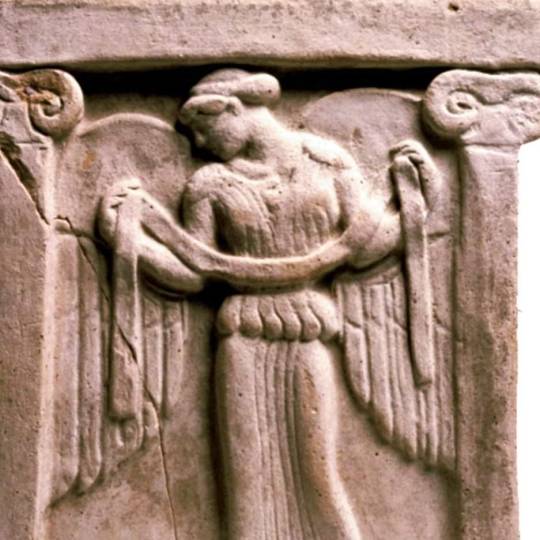
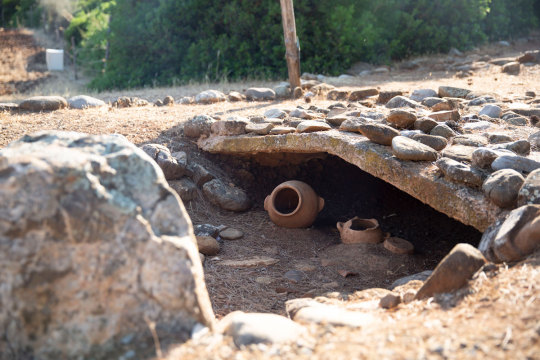
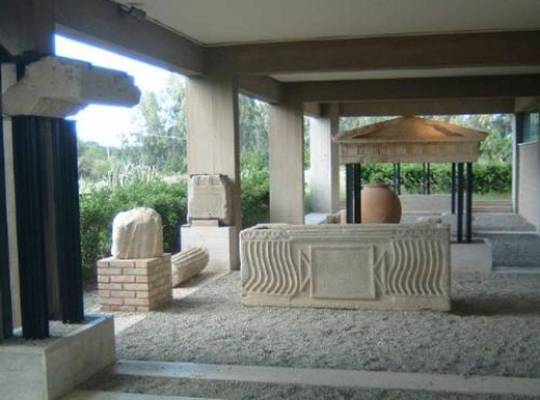
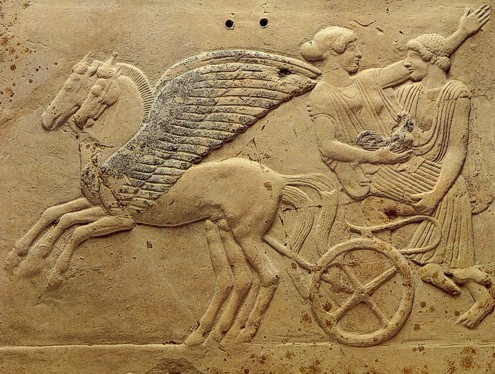

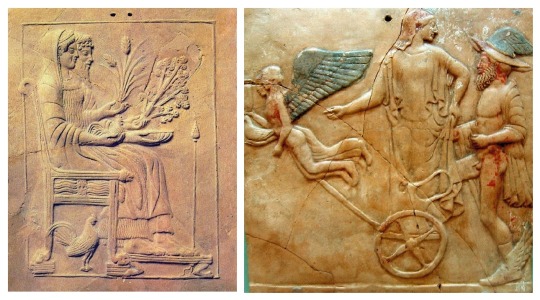
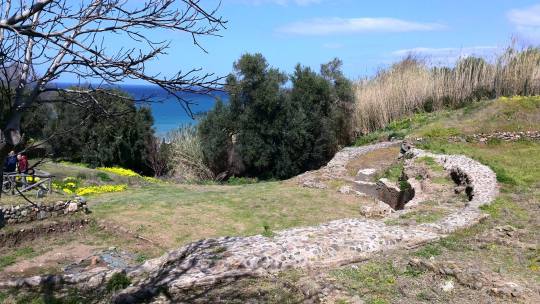

Locri, Calabria, Italy
Locri Epizefiri (Greek Λοκροί Ἐπιζεφύριοι; from the plural of Λοκρός, Lokros, "a Locrian" and ἐπί epi, "on", Ζέφυρος (Zephyros), West Wind, thus "The Western Locrians") was founded about 680 BC on the Italian shore of the Ionian Sea, near modern Capo Zefirio, in Southern Italy's Calabria, by the Locrians, apparently by Opuntii (East Locrians) from the city of Opus, but including Ozolae (West Locrians) and Lacedaemonians.
Due to fierce winds at an original settlement, the settlers moved to the present site. After a century, a defensive wall was built. Outside the city there are several necropoleis, some of which are very large.
Locris was the site of two great sanctuaries, that of Persephone and of Aphrodite. Perhaps uniquely, Persephone was worshiped as protector of marriage and childbirth, a role usually assumed by Hera, and Diodorus Siculus knew the temple there as the most illustrious in Italy.
In the early centuries Locris was allied with Sparta, and later with Syracuse. It founded two colonies of its own, Hipponion and Medma.
During the 5th century BC, votive pinakes in terracotta were often dedicated as offerings to the goddess, made in series and painted with bright colors, animated by scenes connected to the myth of Persephone. Many of these pinakes are now on display in the National Museum of Magna Græcia in Reggio Calabria. Locrian pinakes represent one of the most significant categories of objects from Magna Graecia, both as documents of religious practice and as works of art. In the iconography of votive plaques at Locri, her abduction and marriage to Hades served as an emblem of the marital state, children at Locri were dedicated to Persephone, and maidens about to be wed brought their peplos to be blessed.
During the Pyrrhic Wars (280-275 BC) fought between Pyrrhus of Epirus and Rome, Locris accepted a Roman garrison and fought against the Epirote king. However, the city changed sides numerous times during the war. Bronze tablets from the treasury of its Olympeum, a temple to Zeus, record payments to a 'king', generally thought to be Pyrrhus. Despite this, Pyrrhus plundered the temple of Persephone at Locris before his return to Epirus, an event which would live on in the memory of the Greeks of Italy. At the end of the war, perhaps to allay fears about its loyalty, Locris minted coins depicting a seated Rome being crowned by 'Pistis', a goddess personifying good faith and loyalty, and returned to the Roman fold.
The city was abandoned in the 5th century AD. The town was finally destroyed by the Saracens in 915. The survivors fled inland about 10 kilometres (6 mi) to the town Gerace on the slopes of the Aspromonte.
Today, the modern town of Locri boasts a National Museum and an Archaeological Park, etirely dedicated to the ancient Greek city. The museum preserves the most important findings of the time, such as vases, pinakes, tools used in everyday life, architectural remains from the various excavation area.
Follow us on Instagram, @calabria_mediterranea
#locri#calabria#italy#italia#south italy#southern italy#mediterranean#mediterranean sea#magna graecia#magna grecia#archaeology#archeology#ancient#art#ancient art#history#ancient history#greek#greek art#ancient greece#landscape#italian#italian landscape#landscapes#europe#persephone#olive trees#olive tree#nature#nature photography
74 notes
·
View notes
Text
I'm not over how Pyrrhus of Epirus died.
A famous and very capable warrior king who, in the middle of a disastrous battle inside a city, was battling a random soldier whose name is not even known.
And then the soldier's worried mother, who was watching the battle from the rooftops, threw a roof tile at Pyrrhus. She not only hit him but also knocked him off his horse and broke his spine.
28 notes
·
View notes
Text

The "Armor of Pyrrhus," from a book called Tableau historique des costumes, des moeurs et des usages des principeaux peuples de l''antiquité et du moyen age, 1810.
Pyrrhus was the king of Epirus in Greece in the early 200s BCE. He put together a small empire, conquering parts of Italy and Sicily from the Romans and Carthaginians before losing it all. Pyrrhus is most famous because he was the origin of the phrase "Pyrrhic victory" -- a win that is so costly that the winner may wish he hadn't won at all.
{WHF} {Medium}
39 notes
·
View notes
Text
just a post of thoughts and headcanons about lysandre's team bc i've been thinking about that and now when i think about stuff i'm like "oh i can post about it on tumblr dot com"
lysandre's team is by and large royalty-themed which makes sense of course! no particular order to tackle them in just vibing

pyroar is the pokémon usually associated with lysandre in official merch and the likes. his hair was definitely styled to be reminiscent of a mane. the imagery is straightforward: lions are associated with kings. there's the whole "king of the jungle" thing ofc but also lions are associated with english royalty in particular. the lion association is probably also what influenced him having a 4:1 female/male ratio of scientists.
i tend to write litleo as being lysandre's first pokémon, given to him as a child as a family tradition. this would be how malva got hers as well.
the nickname "Orléans" probably doesn't require much of an explanation; it's a name associated with the french royal family. if you want bonus lore about it though, i actually partially stole it from a movie called Marquis which is about a talking dick and involves terrifying puppets, one of which is a lion named Orléans. i have not seen the movie.

gyarados is lysandre's mega-evolved pokémon. i find this fact fascinating for many reasons, some i will explain shortly. magikarp's japanese name is koiking and its design is definitely kingly. interestingly, it mostly loses these attributes upon evolving, which might make it seem like an odd choice for a royalty-themed team. i have shared some of my thoughts about lysandre's gyarados in a previous post, but i will touch on a point i haven't discussed yet (here at least. i've talked about it a bit on twitter.)
even disregarding shipping opinions, it's plain as day that lysandre and sycamore were created as counterparts. thematically, they are linked respectively to death, despair, pessimism, destruction, the color red (yveltal) and life, hope, optimism, creation, the color blue (xerneas.) imo the fact that lysandre's key pokémon is blue and associated with the opposite type to his other main pokémon (water vs fire) isn't a coincidence. we can only speculate what it means, i suppose, but i find it very interesting.
i tend to write magikarp as being lysandre's second pokémon, usually because his litleo caught one and lysandre rescued him as a result. (him having a cat and a fish is also kind of funny...)
the nickname "Charlemagne" probably doesn't merit an explanation either. he's a frank king. it's a long name, which fits a long pokémon.

mienfoo/mienshao is an ermine, which are linked to royalty because of the fur, mostly, although it also relates to heraldry. it's definitely lysandre's most underrated pokémon imo.
i haven't actually written about how lysandre and mienfoo met much! i tend to see him as being his most recent pokémon. rescued by sycamore and kept at the lab, he takes an interest in lysandre. maybe i'll write about it in more details someday.
the nickname "Pyrrhus" comes from King Pyrrhus of Epirus from which comes the term "pyrrhic victory." it also means "red-haired" so there's that. i don't think either of those require much elaboration.

it's not the first instance of murkrow/honchkrow being linked to a team leader, and it's pretty unsurprising, considering honchkrow's whole deal is being at the head of a murkrow gang. in french its name even contains the word "boss" (and in english, of course, there’s “honcho” in there as well.)
the link with royalty isn't as straightforward at first, but my personal theory is that it relates to Odin and his crows. there are a lot of references to norse mythology in pokémon xy, most notably irt the legendary trio, so it doesn't seem that far-fetched. Odin is tied to death, war, and royalty (among other things.)
i also have never written about lysandre meeting his murkrow. i like to think they ran into each other in some of his later travels, maybe before he met sycamore in lumiose.
the nickname "Léon" doesn't actually have any interesting story behind it! obviously it relates to lions, but i was actually thinking of the fact that in french people say that a peacock's cry sounds like "Léon"... how this relates to murkrow/honchkrow, don't ask me, but it stuck.
that's most of what i had to say on this subject, heehoo. i'll leave you with this old drawing.

#samthoughts#i don't know who these posts are for but i'm having fun writing them and that's what matters to me rn ngl
23 notes
·
View notes
Text
ME PERSONALLY,, I THINK CAITIBUGZZ SHOULD LISTEN TO "Pacific" by Chase petra!!
Its SUCH a good song I wont stfu about it
youtube
The lead singer, Hunter Allen, has said its about a Pyrrhic victory:
"The word comes from the name of Pyrrhus, a long-ago king of Epirus, who suffered heavy losses in defeating the Romans at Asculum in Apulia in 279 B.C.E." (merriam-webster dictionary)
It isnt about Pyrrhus' "pyrrhic victory," rather its about Hunter's own pyrrhic victory.
One of my favorite lyrics from it is:
"I looked like I owned the ocean, after 20 years of staring at the sea / and all I could think about was the sand at the bottom / and how I wish that it would bury me"
#caitibugzz#chase petra#I would @ caiti but Idk if thats rude or not hhh#good song#music reccomendations#Youtube
7 notes
·
View notes
Text
pyrrhus of epirus is such a funny historical figure. cringefail king
13 notes
·
View notes
Text
I have notes somewhere with all the names of the characters written out and their meanings. Since Tamsyn had said the names were important.
And there are some I can remember and some I can’t. But oh my god the reason they’re so important is because John named his Lyctors after the resurrection, didn’t he? Or he allowed them to take their own names? I think Pyrrha still calls Gideon ‘G-’ at one point so maybe they do remember their old names?
I will have to find it and write it out again. Augustine likely named after St Augustine who wrote on the concept of the Just War. Cristobel’s name taken from an unfinished poem where the daughter of a king meets an obviously evil person but is so naive she brings them back to her father’s keep in friendship!!! Pyrrha from Pyrrhic victory and Pyrrhus of Epirus but also Gideon who was (iirc) a king and master tactician who won a battle with overwhelming odds. Naberius taken from alchemical texts (which were the fusion of science and faith) where he was recognized as a prince of hell!!!!
6 notes
·
View notes
Text
This embezzlement is latent in the fact that a group as a whole can be represented, in the various meanings of the word, by a subgroup, clearly delimited and perfectly visible to all, known to all, and recognized by all, that of the nobiles, the ‘people who are known,’ the paradigm of whom is the nobility, and who may speak on behalf of the whole group, represent the whole group, and exercise authority in the name of the whole group. The noble is the group personified. He bears the name of the group to which he gives his name (the metonymy which links the noble to his group is clearly seen when Shakespeare calls Cleopatra ‘Egypt’ or the King of France ‘France,’ just as Racine calls Pyrrhus ‘Epirus’). It is by him, his name, the difference it proclaims, that the members of his group, the liegemen, and also the land and castles, are known and recognized. Similarly, phenomena such as the ‘personality cult’ or the identification of parties, trade unions, or movements with their leader are latent in the very logic of representation. Everything combines to cause the signifier to take the place of the signified, the spokesmen that of the group he is supposed to express, not least because his distinction, his ‘outstandingness,’ his visibility constitute the essential part, if not the essence, of this power, which, being entirely set within the logic of knowledge and acknowledgment, is fundamentally a symbolic power; but also because the representative, the sign, the emblem, may be, and create, the whole reality of groups which receive effective social existence only in and through representation.
on the existence or non-existence of a caliph of Rationality
#bourdieu#the forms of capital (1986)#the best part is where your spokesmen are imputed upon you by your enemies#moldbug turns this into a kind of judo move where any weak defenders of him are stuck in the brutal swamps of comparing statistics#from the victorian era#while his strongest defenders can seize upon the bullshit about stuart restoration and preach against the evils of demotism:#the evils of Dissenters of habeas of the confirmation of the advisors to the executive by the legislature etc.
2 notes
·
View notes
Text
"The Collapse of the New Polish Left." Damian Winczewski, Monthly Review.
"This outline of the political situation in Poland, which, after its neoliberal transformation has been ruled alternately by liberals and nationalists, constitutes a context for the reflections of contemporary politically active left-wing intellectuals. Having largely abandoned the Marxist apparatus as obsolete, they attempt to resort to or create new, fashionable concepts that intend to re-empower the left. In fact, however, these turn out to be ideological justifications for increasing opportunism...
"...In recent years, following the full-scale Russian military intervention in Ukraine and the outbreak of a massive international-scale crisis in which the Polish authorities have played a major role, the reconstruction of the intellectual and political identity of the Polish left has become even more difficult. At present, the majority of its representatives speak with one voice with the government camp, supporting the militarization of the country and even competing with the government for bizarre, militaristic ideas. At the ideological level, the dissociation of the Polish left from its Western anti-imperialistic counterpart has been justified by the concept of “Westplaining,” which was introduced into the public debate by Jan Smoleński and Jan Dutkiewicz, both columnists for Political Critique. According to them, “Westplaining” is basically any criticism of the United States and NATO. It allegedly treats the peoples of Eastern Europe as objects and ignores their belief that the United States and NATO are agents of rescue from and an alternative to centuries-old Russian colonialism.
"In other words, according to columnists associated with the Polish left, criticism of Western imperialism in a period of war is forbidden because support for it is the democratic will of the East European peoples. This is how Polish leftist activists compensate for decades of failures and missed opportunities: by lecturing their Western colleagues from a position of moral superiority and making themselves spokespeople for an abstract populace, while the real Polish working class, after years of being left alone in class struggle, is already completely indifferent to such leftist messages. The Polish left is now deluding itself into believing that it will win the favor of the people by affirming a conservative ideology allied with Western imperialism...
"...Overall, the New Left received the smallest working-class support of all parties (only 5 percent of the vote) [in the October 2023 elections], with their biggest supporters appearing to be the metropolitan middle class. Despite this, they have announced great success, as they could become an important part of the new government under the leadership of the neoliberals of the Citizen Platform (which won 30.7 percent of the vote). These politicians, in turn, are already announcing cuts in social spending and the need to “balance the budget.” To paraphrase the ancient king of Epirus, Pyrrhus: A few more such successes of the left, and there will be no left at all."
https://monthlyreview.org/2023/12/01/the-collapse-of-the-new-polish-left/
0 notes
Note
Okay thanks to movies and series many foreigners are aware of the Trojan and the Thermopylae war (with the 300 Spartnas). But i believe not many know other important battles that happened during ancient Greece.
Which ones do you think are also worth mentioning?
Just some clarifications for interested people who might not know:
While the Trojan War (sometime in c. 1299 BCE - c. 1100) did happen, we have no idea how accurate any realistic event in the Iliad is. The only thing we know is that the consequences of the war were terrible for both sides. The aftermath is believed to have led to a period of deep regression even in victorious Greece, which is known as the Dark Ages.
The Battle of Thermopylae (not war) (480 BC) is a very real battle, part of the ongoing Persian Wars, meaning the attempts of the Persian Empire to conquer the Greek city-states. While the battle was a defeat stained by treason, the conscious sacrifice of the tiny Greek army caused an uprise of pride and resistance from the Greek people, who up to that point were torn as to whether they should fight or not risk opposing to the massive empire. This is why this battle is considered so important.
So some other turning points in Ancient Greek war history were:
The Battle of Marathon (490 BC). First victory of the Greeks against the Persian King Darius I, despite his much larger forces. The Athenian general was Miltiades. Darius wouldn't return but his son Xerxes attempted to materialize his father's dream 10 years later. Western scholars deem this one of the most significant battles in world history.
Naval battle of Salamís (480 BC), Battle of Mycale (479 BC) and the Battle of Plataea (479 BC). Greek victories. In the Battle of Plataea, the Greeks finally manage to create a big army (for Greek standards). This was the final battle that ended the Persian ambitions over Greek territory once and for all.
Many important battles took place during the Peloponnesian War (431 - 404 BCE) but since this was just something that we nowadays would call a hell of a civil war, I don't think it matters a lot to analyze it here. Just imagine literally everyone fighting literally everyone.
Battle of Chaeronea (338 BC). While this is a battle belonging to the great sphere of the violent infighting started and perpetuated after the Peloponnesian War, I'm gonna mention this one because it did change history forever. King Philip II of Macedon alongside the Epirotes, Thessalians, Aetolians, Phoceans and Locrians defeat the usual elites of the Athenians, Thebans, Corinthians, Achaeans, the Chalcidians of Euboea and the Epidaurians. This begins the Macedonian hegemony over Greece, that will lead towards the dissolution of the Greek city-states, the disempowerment of mighty Athens and Sparta, but also the rise of the Macedonian Empire and a more unified sense of Greek identity, in the grand scheme of things.
We talking great battles, right? Not just “side of the angels”... Greeks have given historically significant battles where they were on the offensive, too.
Battle of Issus (333 BC). The Hellenic League led by Alexander the Great defeats the Persian Empire and acquires Asia Minor.
Battle of Gaugamela (331 BC). Under Alexander, Greeks take full control of the Persian Empire.
Battle of the Hydaspes (326 BC). Alexander marches against what is modern-day Pakistan and reaches the outskirts of India.
And we should mention the history-changing defeats:
Pyrrhic War (280–275 BC). The Greek King Pyrrhus of Epirus was asked by the Greeks of South Italy to help them against the rising and expanding Roman Republic. Pyrrhus indeed gave great and demanding fights on their behalf, nearly all of them victories, however these victories were so costly that in the end they turned against the exhausted Greek populations. His victories were soon overturned by the Romans, making famous the phrase “Pyrric victory”, which roughly means “winning the battle and losing the war”.
Battle of Pydna (168 BC). After an initial Greek advantage, Romans eventually defeat the Macedonians and take control of the northern Greek lands.
Battle of Corinth (146 BC). Romans utterly destroy the city of Corinth in the Greek South and assume power over the entirety of Greece, which becomes part of the Roman Empire.
War of Actium (32-30 BC). Long story short, the Romans acquire more and more of the lands once taken by the Greeks. The Ptolemaic Dynasty of Egypt has been going through civil wars, harbored by the Romans. In the War of Actium taking place in Greece and Egypt, Cleopatra and her Roman ally Mark Anthony are defeated by the Roman Emperor Octavian. This is a defeat of the Egyptian people but also the last nail in the coffin of Greek hegemony in the ancient world.
22 notes
·
View notes
Note
i just woke up and reached for my phone to see if you posted anything and bamm! your answer appeared. connection, connection!
any period is fine for me! do your thing nerdy boy 💕💕✨
okay! have you ever heard the expression "pyrrhic victory"? it describes a victory won with such a great cost that it wasn't worth winning!
this expression comes from an ancient greek king called Pyrrhus, who was the king of Epirus, a kingdom located in the north west of Greece and in the south of modern day Albania.
during the 3rd century bc, he declared war on the roman republic after answering the call of the greek cities located in southern Italy, who felt threatened by the romans.
after several "small" victories, Pyrrhus won the battle of Asculum which was a great defeat for the romans. however, Pyrrhus lost too many soldiers in this battle so he couldn't take advantage from it and win his war against the romans who will recover from this defeat!
this is where the expression pyrrhic victory comes from :)
0 notes
Text
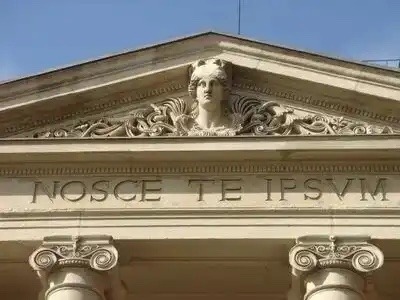
The Oracle of Delphi, a place of pilgrimage
For several centuries, Delphi was the site to which several famous people traveled. These included Philip II, King of Macedonia, Pyrrhus, King of Epirus, Cicero, and Julian the Apostate. At 22,965 feet above sea level and 5.9 miles away from the Gulf of Corinth, it was a powerful place. It was there that the famous Oracle of Apollo stood. This was the place that any mortal could receive a message from the gods regarding their destiny.
The recorded works of Aeschylus, Cicero, Pliny, Plato, Pausanias, and Plutarch gave life to this setting which today only consist of some ruins at the foot of a mountain. These works tell of fountains and forests of laurel. They also tell of the pythonesses or priestesses of the temple who interpreted the messages offered by the gods.
The temple was erected in a place called Pytho. There was a great dragon there that, according to mythology, guarded the Oracle. Apollo killed the creature and took over the sanctuary. The Oracle of Delphi reached its peak in the seventh century BC. However, it lost importance in the times of the Roman occupation of Greece.
The Origin of the Famous Saying "Know Thyself" - Exploring your mind
0 notes
Link
0 notes
Note
No one knows the phrase "Winning isn't everything" better then King Pyrrhus of Epirus.
Alice: True, though I wonder how many people in the modern world know anything about him beyond “he won some battles with heavy losses which inspired the term for a victory that feels like a defeat.” Is having your name immortalized in the English language while your actual legacy fades a Pyrrhic victory in itself?
#~M: I want some questions! now! (ask)#~M: grin without a cat (anon)#~V: Inevitable High School#~T: Bob Cordry For Class President#king pyrrhus of epirus#~C: Alice Liddell#((based on the fact that I realized I knew NOTHING about the guy#except for the term that comes from his name#looked up his Wikipedia page#he led a pretty wild life I gotta say#was king of Sicily for a while#died when the mother of a soldier he was fighting threw a roof tile on him and paralyzed him#letting another soldier behead him))#~M: with this hand I will lift your queue#Anonymous
3 notes
·
View notes